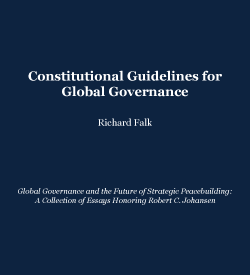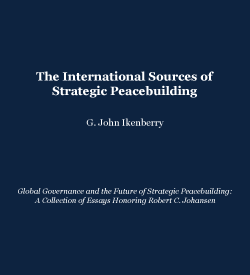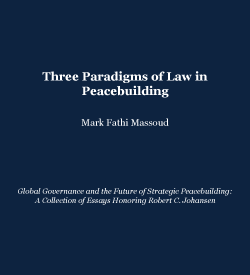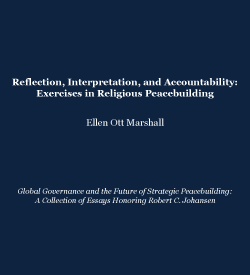A Collection of Essays Honoring Robert C. Johansen
Global Governance and the Future of Strategic Peacebuilding: A Collection of Essays Honoring Robert C. Johansen
In 2012, Robert "Bob" C. Johansen retired from his role as professor of political science and peace studies. Johansen was a founding member of the Kroc Institute's faculty, and was honored from April 19-21, 2012, with a conference celebrating his many contributions to the field of peace studies and the Institute.
The conference, entitled “Global Governance and the Future of Strategic Peacebuilding,” focused on a central theme of Johansen’s scholarship and teaching: the importance of strengthening ethical and legal norms and international institutions that contribute to peace and justice.
Now, on the advent of the publication of Johansen's newest book, Where the Evidence Leads: A Realistic Strategy for Peace and Human Security, the Kroc Institute is pleased to publish four essays growing out of conversations begun at the 2012 conference.
This series was edited by R. Scott Appleby, the Marilyn Keough Dean of the Keough School of Global Affairs, with support from Hannah Heinzekehr, Communications Program Director of the Kroc Institute.

Constitutional Guidelines for Global Governance
Richard Falk is the Albert G. Milbank Professor of International Law and Practice, Emeritus, at Princeton University
In this essay, Falk explores the idea of global challenges, including climate change and nuclear disarmament, as issues that cannot be addressed within a state-centric policy configurations driven by short-term national interests. Falk urges policymakers and scholars to imagine "unrealistic" political spaces that can generate plausible solutions to these daunting challenges.

The International Sources of Strategic Peacebuilding
G. John Ikenberry is the Albert G. Milbank Professor of Politics and International Affairs at Princeton University and Global Eminence Scholar at Kyung Hee University in Seoul, South Korea
In this essay, Ikenberry explores the question, what type of international order is most supportive of the vision of strategic peacebuilding? He takes a historical look at the types of international order that have supported the international community in strategic peacbuidling efforts, and explores possible reforms and transformations needed to better equip the international community to act in a strategic peacebuilding capacity.

Three Paradigms of Law in Peacebuilding
Mark Fathi Massoud is Professor of Politics and Legal Studies at the University of California, Santa Cruz. He is a 2000 alum of the Kroc Institute's Master's in International Peace Studies Program.
In this essay, Massoud draws on Robert Johansen's humanist approach to international relations, in order to explore the role of law in building people's commitments to peace and values. His research draws on research from contexts where state leaders have wielded the power of the law against movements and actors for justice.

Reflection, Interpretation, and Accountability: Exercises in Religious Peacebuilding
Ellen Ott Marshall is Professor of Christian Ethics and Conflict Transformation and Director of the Graduate Division of Religion at the Candler School of Theology, Emory University
In this essay, Ott Marshall puts forward two arguments about religious peacebuiding. First, that peacebuilding that is religious not only explores texts, traditions, communities, identities, and practices, but examines the interpreting framework of the peacebuilding actor. She suggests that when peacebuilding prompts this level of analysis and reflection, it becomes "religious work." Secondly she suggests that this type of work necessitates a particular disposition known as theological humility, and unpacks what this means in practice.